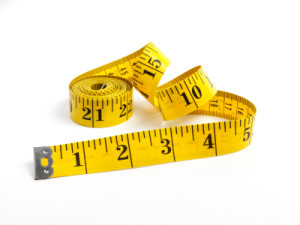What’s Your Measuring Tape?
Sometimes life prompts us to ask: what progress am I making? Am I moving closer to my vision of what’s worthwhile, or am I (even inadvertently) moving farther away? Most of us have a natural tendency to keep score. The question is whether we’re measuring all of the right things. I’m learning to add dimensions to my measuring tape.
Last week my family and I flew to Massachusetts for a road trip down memory lane: our 15-year college reunions. My wife and I attended college on opposite ends of the state in the mid-90s and later met, dated and married there. On our trip, I had breakfast with three of my closest friends from college. We graduated the same year from the same school in the same program. One went to London, one to New York, one to Boston and me to Minneapolis. Fifteen years later, after not having all been together for as many years, we each gave updates: home, family, work, interests, community involvement… It was fun to share our accomplishments with one another, especially since we had once travelled the same path. It was tempting to consider their accomplishments as a benchmark for my own success. While accomplishments are easy to observe and measure, I’m realizing success is less about well-doing and more about well-being.
Here are three dimensions of well-being we might consider:
1. Quality of relationships. HBR professor and author Clayton Christiansen warned the class of 2010 Harvard Business School grads that people with a high need for achievement “unconsciously allocate time and energy to activities that yield the most tangible accomplishments.” As a result, he says, we tend to under-invest in those areas that we once might have said mattered most, like our relationships. The quality of relationships, while much harder to measure, is an important and lasting measure of success.
2. Emotional health. Last week, Training Magazine published an article I wrote about how we can train our mind toward healthier emotional processes. Becoming more emotionally mature takes time and practice. It makes us more confident, happier and effective. While difficult to measure, emotional health contributes significantly to our long-term quality of life.
3. Work-life blending. Technology has allowed more people to integrate their work and personal life. Speaker and author Paul Batz prefers the term “blending” over “balance” and has developed a self-assessment in his book What Really Works gauging satisfaction in the areas of faith, family, finances, fitness, friends, fun and future. Measuring our combined satisfaction across these areas tells us how well we are prioritizing and blending what really matters to us.
Are you moving closer to your vision of what’s worthwhile or farther away?










Matt, my initial thoughts as I was reading this what that you were going to discuss comparisons to others. Your angle is very nice, bit hard to quantify – which is not a bad thing.
I try to espouse, thought not always successfully, to teachings of John Wooden. His philosophy was to look to become the best you can be; doing so is a truer measure of success.
Engaging in the journey of life, and appreciating the experiences that come with it (as I think some inner meaning to your thoughts bring out) helps bring out satisfaction in my opinion. I think of a person I went to graduate school with that ended up having a much different life than what she envisioned due to choices she made for love and family. She was the person that fit quality of relationships; having set up tangible accomplishments as determiners of success. In her 40s, she wondered what happened. Her business side hadn’t lived up to her aspirations, but her other side was much more fulfilled.
Life has a way of putting situations in front of us that force us to make decisions based on the best available information in front of of us at the time. Had I gone to an Argentine graduate program, I never would have met my friend above. Had I not had trouble finding good work after graduate school, I never would have gotten in a situation where I met my wife (I very successful accomplishment, at least on my side of the coin).
Keep up the good work, Matt.
Erik, thank you for the comment. I really like your John Wooden reference that we each need to become the best of ourselves. Also interesting note that success is about making the best of our circumstances or available information.